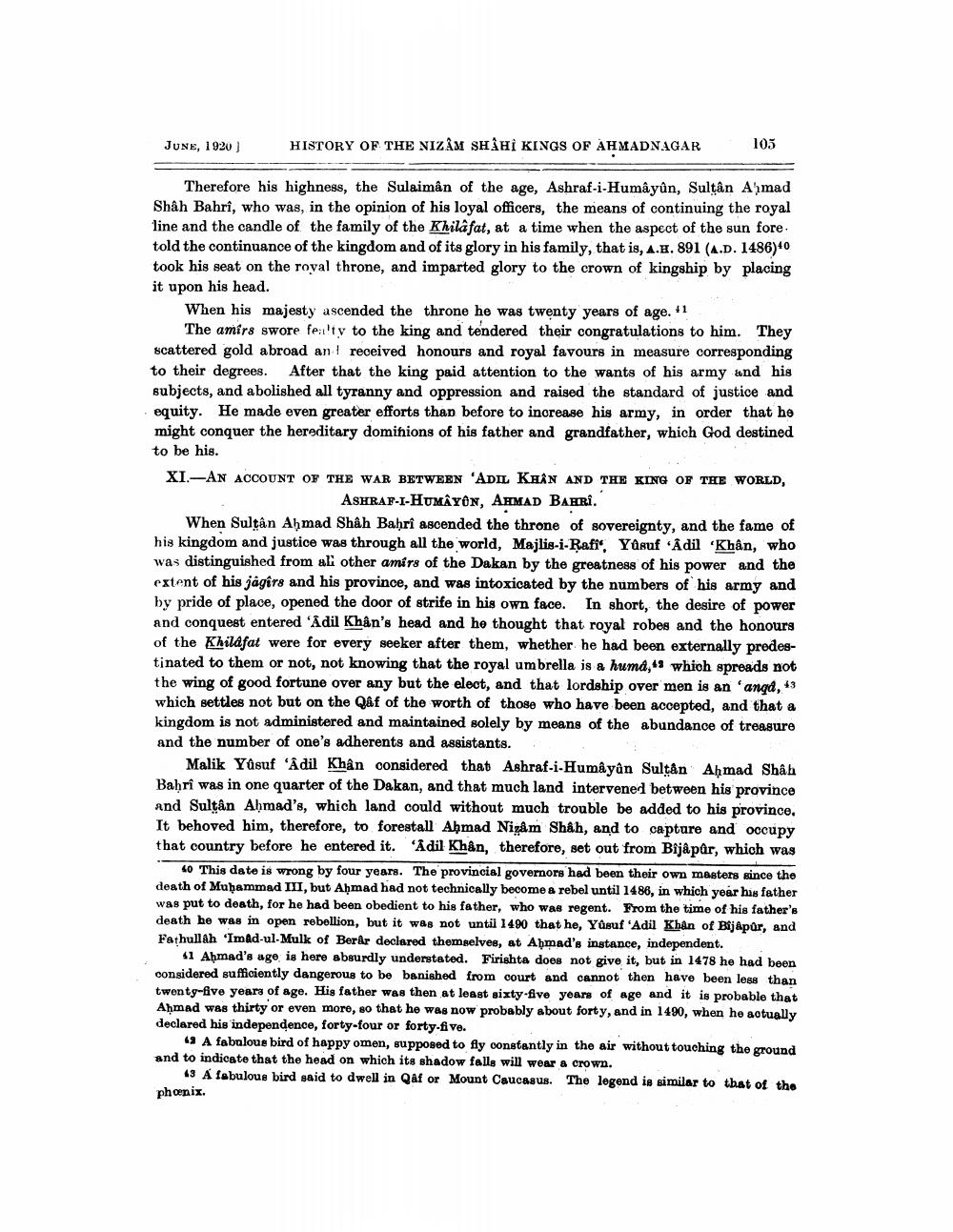________________
JUNE, 1920
HISTORY OF THE NIZAM SHÂHI KINGS OF AHMADNAGAR
105
40]
Therefore his highness, the Sulaiman of the age, Ashraf-i-Humâyûn, Sultan Ahmad Shah Bahri, who was, in the opinion of his loyal officers, the means of continuing the royal line and the candle of the family of the Khilafat, at a time when the aspect of the sun fore. told the continuance of the kingdom and of its glory in his family, that is, A.U. 891 (A.D. 1486)40 took his seat on the royal throne, and imparted glory to the crown of kingship by placing it upon his head.
When his majesty ascended the throne he was twenty years of age. 11
The amirs swore fellty to the king and tendered their congratulations to him. They scattered gold abroad an ! received honours and royal favours in measure corresponding to their degrees. After that the king paid attention to the wants of his army and his subjects, and abolished all tyranny and oppression and raised the standard of justice and equity. He made even greater efforts than before to increase his army, in order that he might conquer the hereditary dominions of his father and grandfather, which God destined to be his. XI.-AN ACCOUNT OF THE WAR BETWEEN 'ADIL KHÂN AND THE KING OF THE WORLD,
ASHRAF-I-HUMÂYÊN, AHMAD BAHRI. When Sultan Ahmad Shah Bahri ascended the throne of sovereignty, and the fame of his kingdom and justice was through all the world, Majlis-i-Rafi, Yûsuf 'Adil Khân, who was distinguished from all other amirs of the Dakan by the greatness of his power and the extent of his jagers and his province, and was intoxicated by the numbers of his army and by pride of place, opened the door of strife in his own face. In short, the desire of power and conquest entered 'Adil Khan's head and he thought that royal robes and the honours of the Khilafat were for every seeker after them, whether he had been externally predestinated to them or not, not knowing that the royal umbrella is a humd," which spreads not the wing of good fortune over any but the elect, and that lordship over men is an 'angd, 13 which settles not but on the Qaf of the worth of those who have been accepted, and that a kingdom is not administered and maintained solely by means of the abundance of treasure and the number of one's adherents and assistants.
Malik Yasuf 'Adil Khân considered that Ashraf-i-Humâyân Sultan Ahmad Shah Bahrî was in one quarter of the Dakan, and that much land intervened between his province and Sultan Ahmad's, which land could without much trouble be added to his province. It behoved him, therefore, to forestall Ahmad Nizam Shah, and to capture and occupy that country before he entered it. "Adil Khân, therefore, set out from Bija par, which was
60 This date is wrong by four years. The provincial governors had been their own masters since the death of Muhammad III, but Ahmad had not technically become a rebel until 1486, in which year his father was put to death, for he had been obedient to his father, who was regent. From the time of his father's death he was in open rebellion, but it was not until 1490 that he, Yusuf 'Adil Khan of Bijapur, and Fathullah 'ImAd-ul-Mulk of Berar declared themselves, at Ahmad's instance, independent.
41 Ahmad's age is here absurdly understated. Firishta does not give it, but in 1478 he had been considered sufficiently dangerous to be banished from court and cannot then have been less than twenty-five years of age. His father was then at least sixty-five years of age and it is probable that Ahmad was thirty or even more, so that he was now probably about forty, and in 1490, when he actually declared his independence, forty-four or forty-five.
19 A fabulous bird of happy omen, supposed to fly constantly in the air without touching the ground and to indicate that the head on which its shadow falls will wear a crown.
13 A fabulous bird said to dwell in Qaf or Mount Caucasus. The legend is similar to that of the phoenix.




